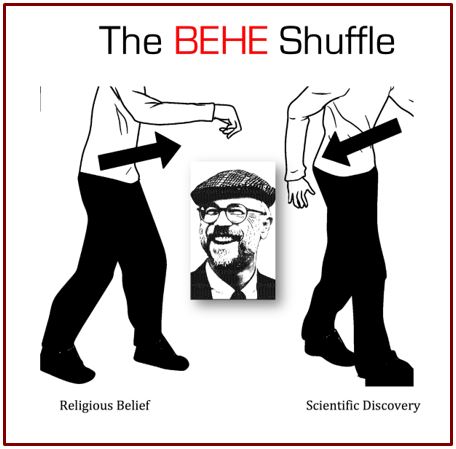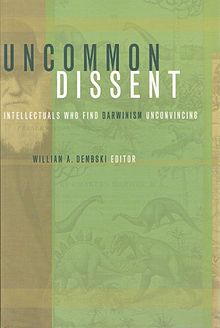TRANSLATE THIS ARTICLE
Integral World: Exploring Theories of Everything
An independent forum for a critical discussion of the integral philosophy of Ken Wilber
 David Christopher Lane David Christopher Lane, Ph.D.
Professor of Philosophy, Mt. San Antonio College Lecturer in Religious Studies, California State University, Long Beach Author of Exposing Cults: When the Skeptical Mind Confronts the Mystical (New York and London: Garland Publishers, 1994) and The Radhasoami Tradition: A Critical History of Guru Succession (New York and London: Garland Publishers, 1992). SEE MORE ESSAYS WRITTEN BY DAVID LANE

The Behe Shuffle
Invoking Religious Authority
to Bypass Scientific Implications
David Lane
“A Culture based on superstitions will do worse than one based on scientific knowledge and rational thoughts”
—Venkatraman Ramakrishnan
My own suspicion is that evolutionary theory explains too much, too well, and too simply and because of this religion is all too fearful of what such portends.
Although I was raised in a fairly strict Catholic family (attending Catholic schools for some eleven years), I had opened mind parents when it came to all things intellectual or scientific.
Surprisingly, one of my first deep encounters with the theory of evolution came in my high school religion class, where our required text was an illustrated book about Teilhard de Chardin and the implications of Darwinian natural selection. Our teacher, Brother Joseph Connell (part of the Brothers of Holy Cross at Notre Dame) explained that Roman Catholicism accepted the theory of evolution and posits a more metaphorical (yet still vitally elemental) view of Adam and Eve. Simply put, Catholicism welcomes the scientific view on the development of man, but believes that God's guiding hand was ultimately behind it all.
This was all fine and good when I was young, but even then I suspected that what Catholicism wanted was to have its cake and eat it too (or, more precisely, have the pretense of accepting science but without having to seriously stomach its much more radical implications).
Don't get me wrong, I applaud Catholicism's openness to science (even if it did take centuries to formally apologize to Galileo's long dead body and memory for his revolutionary breakthroughs) but I question its genuine sincerity when pressed on such metaphysical issues as the “virgin birth,” “transubstantiation” and the “bodily resurrection of Jesus Christ.” It seems as if Catholicism's embrace of science only extends so far and when a core doctrine is contradicted by the latest findings in physics or chemistry or psychology, the Catholic oligarchy retreats behind the all-purpose excuse of “divine mystery.”
Well, if we look at the progressive history of science over the past few centuries it seems awfully suspicious that longstanding divine mysteries have become less and less. When we didn't understand how the sun operated we worshipped it; when we couldn't understand droughts we prayed for rain; and when we didn't grasp how the brain worked, we spoke of demonic possession. It is a bit odd, if also a bit too telling, to ponder why there were so many miraculous events in centuries past when religions held political court (and science was in its infancy), but today such transmundane events are in abeyance.
To put this more pointedly, even if more contentiously, why is it that when science is practiced the gods tend to prematurely die off?
One answer, of course, is that when reason is writ large, superstition disappears accordingly. Yet, it is just a tad disingenuous when religions that on the surface applaud science's wonderful advancements (and try to cherry pick it when such suits their needs) are unwilling to engage with its more far-reaching implications. Is this because the core dogma of many religions has no real basis in fact, but survives primarily on the blind faith of its adherents? Or, worse, by scaring their respective believers from truly thinking through what they actually hold to be true?
Sadly, I think the answer to both of those latter questions is yes.
Religion dances with science so long as it substantiates its worldview and two steps off the floor when it is upended or fundamentally doubted.
A quintessential example of this comes from Michael Behe in his 2004 essay "A Catholic Scientist Looks At Darwinism" (chapter 8 in William A. Dembski's edited volume, Uncommon Dissent: Intellectuals Who Find Darwinism Unconvincing.) Behe writes,
“Well, if the topic of evolution is fraught with pitfalls, then what is a Catholic layperson to do, who simply cannot evaluate the scientific evidence himself? Although it can be difficult, I would simply urge people to reserve judgment, be patient, and look toward the Church for guidance in this philosophically-charged area. As St. Augustine remarked speaking of his embrace of the faith: 'From this time on, I gave my preference to the Catholic faith. I thought it more modest and not in the least misleading to be told by the Church to believe what could not be demonstrated—whether that was because a demonstration existed but could not be understood by all or whether the matter was not open to rational proof—rather than from the Manichees to have a rash promise of knowledge with mockery of mere belief, and then afterwards to be ordered to believe many fabulous and absurd myths impossible to prove true.' In Fides et Ratio Pope John Paul II explains the Catholic faith allows a very wide latitude to reason in the area of the origin and unfolding of life, pointing out crucially that we need to realize in all things 'it is God of Israel who acts.'”
I call this curious intellectual hustle the Behe Shuffle, where one invokes religious authority to bypass the purported ramifications of a scientific discovery. The operative fear here is that the Church will lose its power and sway over its members if they are allowed to follow science's pathway to its logical conclusion.
Look very closely at Behe's wording and his citation of Roman Catholic sanctioned quotes.
1. Instead of simply allowing evolutionary biology to run its course and letting the empirical chips of data fall where they may, Behe suggests that the naïve layperson is better off looking “toward the Church for guidance in this philosophically-charged area.” Huh? How is Catholicism a better guide here when in point of fact it is a scientific inquiry? Would Behe think the same about such advice if it came from a Scientologist who argued that it was better to listen to the counsel of L. Ron Hubbard when it came to controversial issues in astronomy? I think not. Replace Catholicism with any other religious ism and you immediately see how myopic (or should I say cultic?) Behe's advice really is, particularly coming from someone claiming to be well versed in biochemistry.
2. Behe's extended citation of St. Augustine is curious indeed, since a careful analysis of it contradicts the essence of the scientific endeavor, particularly when the famed Church father can write (apparently with a straight face) that it is “not in the least misleading to be told by the Church to believe what could not be demonstrated—whether that was because a demonstration existed but could not be understood by all or whether the matter was not open to rational proof.”
Augustine's quote, lest we forget its real import, is a rhetorical justification for believing something that to the rational mind either appears to have no convincing proof or, worst, looks (quite literally here) like nonsense. Is it really sensible for us to surrender our critical faculties to religious authorities and believe no matter what because it is part and parcel of our faith? How is such mind numbing obedience any different than being in a cult?
But Michael Behe doesn't see it this way, just as most strident religionists (of whatever persuasion) don't see beyond their chosen belief systems. This may be understandable if Behe were preaching from a Catholic catechism to an already baptized congregation, but it is quite another if he wants to persuade agnostic intellectuals of his scientific argument.
It is obvious that Behe shuffles between wanting to sound scientific and protecting his faith (and those of like minded ilk) from the dangers of unabashed naturalistic thinking. In so doing, Michael Behe ends up tripping on his own misguided reasoning and leaves the reader wondering why Catholicism or any other religion should enter into a purely scientific debate. Why is the theory of evolution (and not the theory of gravity, say) such a contentious topic? My own suspicion is that evolutionary theory explains too much, too well, and too simply and because of this religion is all too fearful of what such portends. Given science's recent track record, such a fear may indeed be well founded and all one can opt for (if wishing to retain a semblance of faith in a world that repeatedly contradicts it) is to do the Behe Shuffle, invoking religious authority to sidestep the implications of a Darwinian worldview.
“There is a fundamental difference between religion, which is based on authority, and science, which is based on observation and reason. Science will win because it works.” ¯ Stephen Hawking
|
 David Christopher Lane, Ph.D.
Professor of Philosophy, Mt. San Antonio College Lecturer in Religious Studies, California State University, Long Beach Author of Exposing Cults: When the Skeptical Mind Confronts the Mystical (New York and London: Garland Publishers, 1994) and The Radhasoami Tradition: A Critical History of Guru Succession (New York and London: Garland Publishers, 1992).
David Christopher Lane, Ph.D.
Professor of Philosophy, Mt. San Antonio College Lecturer in Religious Studies, California State University, Long Beach Author of Exposing Cults: When the Skeptical Mind Confronts the Mystical (New York and London: Garland Publishers, 1994) and The Radhasoami Tradition: A Critical History of Guru Succession (New York and London: Garland Publishers, 1992).
